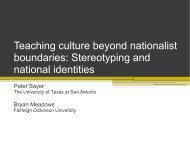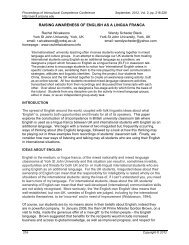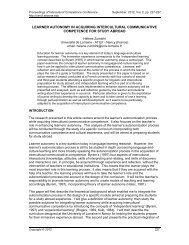BYRAM VERSUS BENNETT: DISCREPANCIES IN THE ... - CERCLL
BYRAM VERSUS BENNETT: DISCREPANCIES IN THE ... - CERCLL
BYRAM VERSUS BENNETT: DISCREPANCIES IN THE ... - CERCLL
Create successful ePaper yourself
Turn your PDF publications into a flip-book with our unique Google optimized e-Paper software.
Paula Garrett-Rucks Byram Versus Bennett<br />
Discussion 1, Phase 2: I liked how Thomas was hesitant to use la bise or smiling. He<br />
preferred to wait until he knew you better. That seems reasonable to me…. I didn't<br />
agree with her [Aunt Anne] calling our smile artificial, but I do agree with a less often<br />
smile being more meaningful and spontaneous (James, Week 3).<br />
I evaluated this posting to be reflective of ethnorelative thinking, and categorized James to be in<br />
the Acceptance Stage of the DMIS model due to his apparent respect for cultural differences.<br />
However, James’ Week 4 response posting reflected ethnocentric thinking in regard to<br />
behaviors and values.<br />
Discussion 1, Phase 2: I also think it was weird that they [the French informants] called<br />
our smile phony. Smiling makes its way into my day quite often (James, week 4). [my<br />
emphasis]<br />
James altered the developmental flow occurring in the dynamics of the discussion by digressing<br />
from an Acceptance Stage in Week 3 to a Defensive Stage in Week 4, contradicting what he<br />
had stated five days earlier where he had written that he agreed with the French perspective of<br />
smiling that smiling less often would make it more meaningful. By the use of the word also in<br />
James’ response posting, it becomes apparent that he had appropriated the opinions previously<br />
expressed by his peer.<br />
I must emphasize that I was only evaluating statements participants made pertaining to the<br />
most salient cultural practice addressed in the discussions. Furthermore, I did not include<br />
information from the questionnaires or post discussion interviews with participants. The case<br />
studies of four participants had a wider lens to evaluate the holistic experiences of the learners<br />
as well as a different assessment model based on the definitions created in Byram’s multimodal<br />
model of IC development.<br />
Discrepancy 2: The role of the evaluator’s subjectivity<br />
As expressed in the previous section, the assessment of the focus participants’ intercultural<br />
attitudes, knowledge and skills was straightforward when situating learners’ comments within<br />
Byram’s multimodal model. When I was uncertain about evaluating the learners’ comments<br />
based on the general definitions provided, I referred to the additional objectives Byram provided<br />
for each of the three factors—5 objectives for Attitudes, 11 objectives for knowledge, and 3<br />
objectives for skills—for further clarification (Appendix C). These additional detailed<br />
performance objectives Byram outlined for each of these categories seemed to provide a larger<br />
net to detect changes in learners’ worldviews within each of the categories. However, my<br />
application of Bennett’s DMIS proved to be problematic when assessing individual learners IC<br />
assessment based on their comments toward a unique cultural practice. Using the criteria<br />
provided by Bennett was particularly difficult when assessing learners’ postings in which they<br />
made conflicting statements. For example, in Phase 2 of Discussion 2, learners accessed the<br />
French informant interviews where all four of the informants essentially had positive comments<br />
to make about the French education system.<br />
I think it’s very different that the French require high school students to select a<br />
"specialized area of focus" before their junior and senior years of high school. I suppose<br />
on one hand, it can be effective because it gives high school students a set path of how<br />
to become successful in a field of their choice. On the other hand, I feel that it could in<br />
some ways cripple a student’s ability to explore all of their interests by making school too<br />
practical (Jack, Week 1). [my emphasis]<br />
<strong>CERCLL</strong> ICC Proceedings 23





